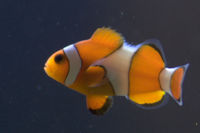Difference between revisions of "Amphiprion ocellaris"
From The Aquarium Wiki
Tvisharaaja (talk | contribs) |
m (Reverted edits by Tvisharaaja (talk) to last revision by PsiPro) |
||
| Line 16: | Line 16: | ||
|size_units=in | |size_units=in | ||
|stocking_ratio_male=1 | |stocking_ratio_male=1 | ||
| − | | | + | |stocking_ratio_female=1 |
|diet=O | |diet=O | ||
|food_flake=Yes | |food_flake=Yes | ||
Revision as of 20:32, 30 March 2020
Ocellaris Clownfish
Amphiprion ocellaris
114 Litres (30 US G.)
7.6-10.2cm (3-4 ")
8.0 - 8.5
24.4-27.8°C (76 -82 °F)
8-12 °d
1:1 M:F
5-8 years
Family
Pomacentridae
This animal is available captive bred
Contents
Additional names
- Ocellaris Clownfish, Common Clownfish, False Percula Clownfish, False Clown Anemonefish, Anemone Demoiselle, Nemo
Additional scientific names
- Amphiprion melanurus, Amphiprion bicolor
Origin
- Widespread throughout the Indo-Pacific.
Sexing
- There are no physical characteristics to tell the sex of the fish. In a pair or a group, the biggest Clownfish is the female and the next largest will be male. Like other Clownfish, this species is hermaphroditic. If the female dies or disappears, the male will become the new female and another sexually immature specimen will quickly develop into a reproductive male.
Tank compatibility
- They will not generally bother corals or any invertebrates. They can be territorial towards other Clownfish or Damselfish. Do not keep them with larger predatory fish.
Diet
- This fish will eat most foods offered including flake, frozen, and live foods.
Feeding regime
- Feed twice daily.
Environment specifics
- Needs a salinity between 1.020 and 1.026 and a spacious tank with plenty of hiding places in live rock. It will host anemones such as Heteractis magnifica or Stichodactyla sp, but captive bred specimens will also host long-tentacled corals.
Behaviour
- Clownfish are territorial and will defend their territory against other fish. Can be kept singly, but a pair or a group will show interesting social behaviour. They do not need a sea anemone to thrive, or even to breed, in the aquarium. If an anemone is included, they will defend it and will rarely stray more than 4" away from it, except to feed.
Identification
- The Ocellaris Clownfish has three white stripes with thin black outlines with bright orange between the white stripes. They look a lot like the Percula Clownfish but the Percula Clown has thicker black lines in between the white and orange plus the orange is less bright on the Percula. Tank bred Ocellaris Clowns may not have full white stripes. Another way to tell them apart is that the true Percula has 10 spines in the first dorsal fin, the False Percula has 11 spines. False percula are gentler than true Percula.
- There are also now available, mainly from selective farm breeding, a Black (Melanistic) version, a Mis-Bar version (irregular bar, not covering entire flanks) and Stubby version (shorter body length). The latter two may be from inbreeding of stock.
Pictures
External links
- Fishbase (Mirrors: Error creating thumbnail: Unable to save thumbnail to destination)
- Aqua Hobby
- Amonline
- Live Aquaria - Black Variant
- Pet Education
- Reefsuk.org - Breeding Ocellaris Clownfish






